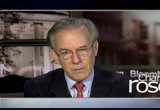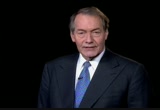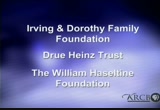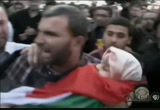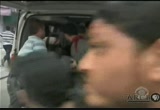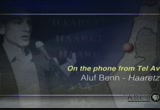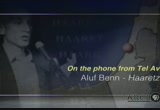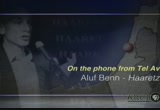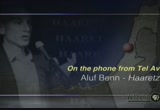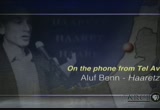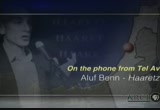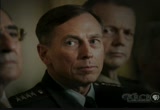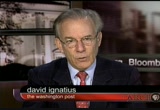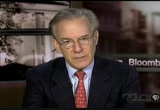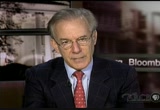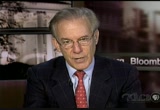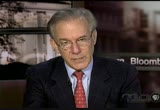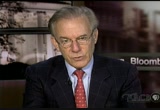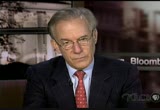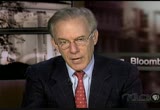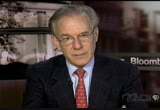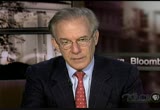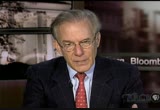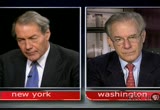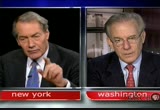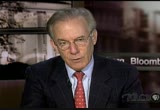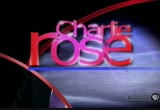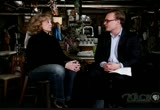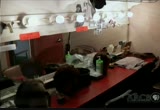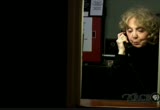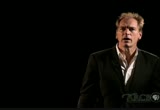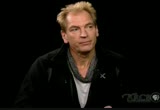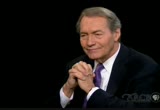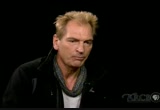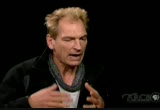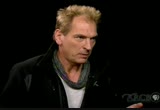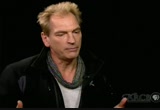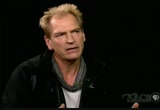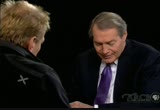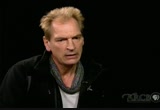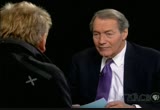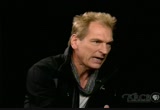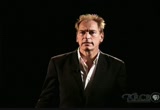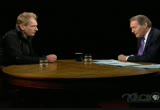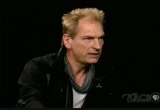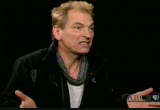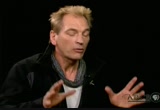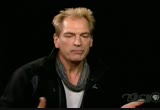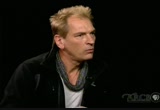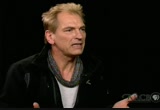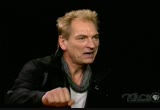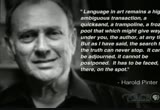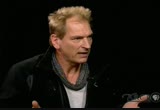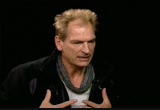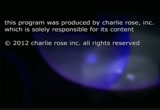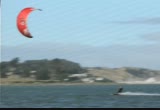tv Charlie Rose PBS November 19, 2012 11:00pm-12:00am PST
11:00 pm
. >> rose: welcome to the program. we begin this evening with the possibility of a cease-fire in the conflict between israel and hamas and we talk to huff benn from "ha'aretz." >> i think a cease-fire will be put in place. i hope it will happen wiin the next 24ours to preven and avd and do without the ground invasion with its deadly cost and then when it takes the place
11:01 pm
with the new leader of hamas who has to impose the cease-fire on all the other groups in gaza who are aiming at launching rockets or firing into israeli territory. but at the same time, clearly israel will have to let go some of its black cade of gaza. >> rose: also, david ignatius of the "washington post" from washington. >> on the larger question here of whether the obama administration before the election had an interest in minimizing the public's understanding that al qaeda still posed a threat, a different threat from the one that we were used to with bin laden but a threat nonetheless, i think the answer increasingly yes s yes. they didn't want the public to see that effort as anything other than a great success. that was part of obama's appeal. so i'd say on the particular details, i don't see much. on the broad theme, did they want the public to feel al qaeda
11:02 pm
was down for the count? yes, i think they did. >> rose: we conclude with julian sands, a british actor, talking about harold pinter, the english playwright and nobel laureate. >> in comparison with harold, other people looked blurred because he was such a life force. he was so present. he was so forceful. and he lived by pure intention. >> rose: aluf, dvid ignatius and julian sands when we continue.
11:03 pm
11:04 pm
by israel and hamas. in israel, three civilians have been killed and dozens wounded, hamas has fired more than one thousand rockets into israel, many of which have been intercepted by the iron dome missile defense system. the world watches nervously as the buildup of israeli troops continue along the border. today secretary general ban ki-moon arrived in cairo to support egyptian-led efforts at a cease-fire. yesterday, president obama spoke about the situation from thailand, he is viz thing country as part of a three-country asia tour. >> we are fully supportive of israel's right to defend itself from missiles landing on people's homes and workplaces and potentially killing civilians. and we will continue to support israel's right to defend itself. >> rose: here's what "cbs evening news" reported today from the war zone. >> an angry crowd gathered outside a hospital in gaza this morning as bodies of children killed in yesterday's air strike
11:05 pm
were brought out to be buried. the four children died, along with their mother and four other family members when their three-story home was hit by an israeli air strike. the husband and father who lost his family was inconsolable. the israeli military says the house is targeted because they believe the hamas commander responsible for launching missiles toward israel was hiding there. but with nine members of the same family killed, the israelis say they're investigating the bombing. throughout the night and into today, the israeli military pounded the gaza strip in a bombardment that came by air and by sea. the air strikes are aimed at crippling hamas and its ability to fire missiles into israel. there's no question why this building was hit by israeli air strikes overnight. it's one of the main police
11:06 pm
headquarters here in gaza, but with drones flying overhead in gaza city here this morning and government offices nearby, this is not a place you want to stay for long. we've also avoided getting anywhere near the office used by cbs news in gaza. for the second time in two days, israeli aircraft attacked the media building tha hosts many foreign news agencies. today's strike killed two people including the israelis say its intended target: an islamic militant who was hiding out in the building. hospital officials say of the more than 800 people killed or injured, nearly half are women and children. >> rose: joining me on the phone from tel aviv is aluf benn, editor and chief of the israeli newspaper "ha'aretz" and i'm pleased to have him once again on ts prram. thanyou roing this, i know it's a late hour where you are. >> i'm in tel aviv. >> rose: tell me, why is this
11:07 pm
happening now? >> when the last israeli operation in gaza ended about four years ago, a cease-fire took hold and the cease-fire was in place with intervals of months between rounds of escalation. and then it turned to intervals of weeks and moreeceny it beme intervals of days. and it has been a battle going around the border itself when both sides tried to keep control of the other side's territory and prevented the other side from approaching the fence. and more essentially, each and every round of escalation brought more rockets into israeli territory, more israeli air strikes into gaza. last wednesday it exploded when
11:08 pm
israel killed the military leader of hamas in gaza and then israeli airport destroyed dozens of long range rockets deployed by hamas. and since then israel has been attacked by hundreds of rockets with israeli air force attacking gaza and now we're all waiting to see whether the flare of activity centered in cairo would result in a cease-fire or else israi threatens hamas with a ground offensive which obviously is much costlyer in terms of damages and lives. >> rose: was the assassination of jabbarry a mistake? xwl i don't know it was a mistake. as we saw, the assassination of
11:09 pm
jabbari's predecessor didn't stop the rockets and the assassination of jabari himself didn't stop the rockets. i think this is the kind of signal that israel takes very seriously its border regime and cease-fire regime with hamas and as long as hamas is willing to keep order, to impose the cease-fire on smaller groups in gaza and act as i, i call it, the subcontractor in keeping the cease-fire, as well as willing to deal with hamas however indirectly. but once hamas eier is unable or unwilling to abide by the cease-fire then its leaders should know that they put their lives at risk and put the organization and achievements at risk as well. >> rose: so when you look at where it is now the hamas seems
11:10 pm
emboldened today to use a phrase that's on the headlines of one american newspaper and they're making demands across the board, as if they believe that the ciumstances coming out of th arab spring have so changed their possibilities that they're willing to risk what they know would be a terrible thing if there's an invasion >> well, i think from their point of view they made achievements. one is targeting tel aviv which they failed to hit tel aviv, their rockets were intercepted but they reached tel aviv airspace and all of us heard the air ride sirens go off and we ran to shelters. and this is something that people in tel aviv did the last time in 1991 during the gulf war and then it was iraq, it was saddam hussein not gaza with hamas. the other achievement is is not so much hamas doing but it's the
11:11 pm
implication of the arab spring and today egypt is ruled not by president mubarak, whose regime shared israel's concern and adversity to hamas but by the muslim brotherhood that treats hamas as its podigy, its kind of protectorate in gaza. and qatar -- in a similar fashion qatar is becoming more and more the financial backer of hamas in gaza. so you can argue that the good news is that hamas is further away from iran and from syria. the more radical governments in the region. closer to egypt and qatar who are less radical, re western oriented, more pro-american and with open channels to israel. >> rose: so what do you think is
11:12 pm
going to happen? >> i think a new cease-fire will be put in place. i hope it will happen within the next 24 hours to prevent and avoid and do without the ground invasion with its deadly cast and then whoever takes t place of jbarras the new leader of hamas will have to impose a cease-fire. while at the same time israel will have to let go some of its blockade of gaza. and i think both sides will try the best face-saving formulas which they can deploy in that situation. >> rose: aluf, thank you so much for joining us. >> good evening. >> rose: aluf benn is the
11:13 pm
executive editor-in-chief of the israeli newspaper "ha'aretz." we'll be back in a moment. stay with us. >> rose: the fallout from the benghazi attack tonights, the death of chris stevens and three other americans were blamed on a spontaneous reaction to a video. it became clear what transpired was an act of terror. general david petraeus testified on friday, the former director of the c.i.a. said he was aware from an earlier stage that terrorists wereespoible for the deaths in libya. however, at a certain point references to an act of terror were removed from the talking point which is u.n. ambassador susan rice delivered to the press. many are asking why and how that happened. remember senators john mccain and lindsey graham have attacked susan rice and the president for being deliberately misleading. they've also threatened to block any nomination of rice for the post of secretary of state. she is considered a front-winner to replace secretary of state hillary clinton. joining me now from washington, david ignatius, a columnist for
11:14 pm
the "washington post" and i'm pleased to have him back on this broadcast. that you can, charlie. >> rose: tell me the questions you think are still unanswered. >> my sense as a journalist is there's more smoke than fire in this one that will keep looking and seeing what new facts are uncovered in terms of this word change issue, the white house insists that only one word was changed and it was a fairly trivial one. general petraeus in his testimony on friday said that two or three days after the september 11 attack on the consulate in benghazi the c.i.a. knew that terrorists were involved and more specifically the c.i.a. knew that people who were linked with al qaeda in the maghreb, the al qaeda affiliate, were involved. that was actually briefed to the house and senate intelligence
11:15 pm
committees on the 13th and 14th of september. the committee members were told that in a closed briefing. on the 15th, these talking points were prepared and they were prepared at the request of the house intelligence committee which is chaired by a republican mike rogers, who wanted to know what he could say publicly that would reflect the secret briefing that he had just received. so the talking points were created -- if you leave open the likelihood that these were terrorist attackers but on the question of how the attack came together, the talking points are agnostic, they use the word "spontaneous" at one point and they certainly don't mention this al qaeda link. so the issue is should that classified detail which had been briefed to congress before the talking points were prepared, should have been in the talking points? you can argue that backwards and forwards that they had rnsz to
11:16 pm
believe the sources that allowed them to know about al qaeda were worth protecting and so they took them out and there wasn't any squawk at the time from the republican committee chairman who received the talking points. on the larger question here of wlf the obama administration before the election had an interest in minimizing the public's understanding that al qaeda still posed a threat, a different threat from the one we were used to with bin laden but a threat nonetheless, i think the answer increasingly is yes. they didn't want the public to see that effort as anything other than a great success. that was part of obama's appeal. so i'd say on the particular details, i don't see much. on the broad theme, did they want the public to feel al qaeda was down for the count? yes, i think they did. >> rose: how about on the broader question of the judgment of the c.i.a.? >> well, as i've looked at this,
11:17 pm
charlie, one thing i keep coming back to is unfortunately for intelligence analysts even today-- and i say this advisedly having asked people in the intelligence community-- even today they aren't sure about how this attack came together on the night of september 11. there were different people involved, some were associated with al qaeda in the maghreb. others were associated with also extremist group called ansar al sharia. others were just kind of freelance extremists. others seem to have been along for the ride and looted the compound. and they don't have evidence that even the most extreme people had planned the attack they bragged about how they watched the cairo demonstrations on t.v., talked about what happened in cairo before they made this attack so there is some reason that the analysts thought this might have a spontaneous ad hoc aspect to it.
11:18 pm
one person in the intelligence community told me a couple weeks ago this was a flash mob with heavy weapons. just kind of came together and bank were there some people who had been planning it for a while? there may have been but at this point they don't have the evidence that would prove that. >> rose: what else did petraeus say in the testimony that we know about a lot of this has been kept secret but he walked through his own trip to libya in the week before his resignation under pressure he had gone to north africa, gone to egypt and also gone to libya, talked to some of the people involved in this and i think he wanted ground truth, he wanted to thank the people who acted courageously. that's one thing that sometimes gets left out of the story. i'm sure they asked him about what he found, what requests he asked, what answers he got.
11:19 pm
i'm sure there are other details that go into this that, again, were part of the classified record but i have not been able to learn them. >> rose: where does the investigation of the c.i.a. into general petraeus stand? >> it's continuing investigation by the c.i.a. inspector general. it focuses on the question of c.i.a. resources. the security team watching general petraeus 24/7, he's a high-value target for al qaeda, the people who were carrying him around in vehicles and the question is where c.i.a. resources-- either people or vehicles or hotel rooms or whatever-- misused in an effort to conduct this contact with paula broadwell or conceal it? they're looking at that and that seems like an appropriate question for any organization to look at.
11:20 pm
i don't think they've come up with answers yet. >> rose: what are we learning about that whole sort of timeline? >> the timeline is still fuzzy but from what we think we know the actual affair as opposed to the close friendship, relationship between the biographer paula broadwell and her subject, general petraeus, that the actual affair seems to have begun several months after he left his command in kabul and came back to become c.i.a. director and ended several months ago. in terms of when the president was notified about this, the house intelligence committee chairman mike rogers let slip or said deliberately over the weekend on one of the sunday talk shows that the president may have beenware of the petraeus investigation before the election. that's a pretty serious and sensational statement when he was pressed. that's new, do you have any evidence to support that the?
11:21 pm
he said no, no, i don't, i'm just -- it's just a possibility. a little troubling to put that out without some evidence to back it up. i did ask a knowledgeable person today whether he was aware of any transmission from the justice department, from eric holder who certainly his attorney general would have been aware of what the f.b.i. was doing and i was told no and that it was this person's understanding that holder quite specifically understood how important it was not to let word of this out. not to inform the white house, to keep it at the justice department within proper channels. so i was given a quite specific answer to the question congressman rogers posed but it's a question people are going to want more detail on and they'll want to have people say maybe even on the record there was no leak to the white house. >> rose: there's also this question: did the c.i.a. director petraeus not want to
11:22 pm
resign and then only decided that he should resign after it became public? >> that's a very interesting part of this story and, again, i want to be honest with your viewers, i don't know the answer. it is a fact that after he was informed that this investigation was going on he did not resign that he waited until he was confronted, in effect, by his nominal superior, the director of national intelligence james clapper who called anymore and informed him of the f.b.i. investigation which petraeus we now think already knew about because he'd been questioned by the f.b.i. and claper who just learned of this that day told petraeus "i think as the head of the intelligence community and a
11:23 pm
former officer like you i think you should resign." and petraeus responded "you're right, i think that's the right course to take." would he have done that if he hadn't been confronted by james claper? again, we don't know the answer to that. >> rose: do we know the answer as to why the relationship broke off between broadwell and general petraeus? >> not entirely. the suggestion is it broke off if that it broke off as it was being uncovered but charlie these are details that i just -- we're going to have to await the reconstruction of the e-mail chain. a lot of specific information that we don't yet have so i shouldn't speculate. >> rose: you're wired into the -- not only the c.i.a. but also the national security apparatus. how do they view the risk of the israeli/hamas conflict? >> i think that there is general
11:24 pm
concern within the u.s. government at the n.s.c. that the exexchanges between israel and hamas take israel into territory where it's just hard to know where they're going. i mean, they're now looking for a cease-fire, the u.s. is trying to use every diplomatic contact it has from mohamed morsi, the president of egypt, to the prime minister of turkey, prime minister erdogan to get the cease-fire. i think that the interesting question, the one that really -- the administration would love to focus on in the next few weeks is how do you get to a more stable situation in gaza where israel doesn't have to periodically take out heavy weapons and threaten the ground assault. we don't know yet whether that will happen. and people are talking about lots of possibilities.
11:25 pm
again, the central change that would be most beneficial would be if the new egyptian government decided to really get involved and in effect take ownership of the problems in gaza as the closest backer, supporter, of hamas. and if that happened, you'd have a quite different situation and one that potentially would be a lot better for israel. >> rose: and where are the -- where are the turks and where are the emir of qatar on this issue? >> i think both the turks and the qatarrys are supportive in general but the people with real leverage are the egyptians. and this is the most interesting choice mohamed morsi has yet faced as prime minister in my judgment. how is he going to play this one? i'm told that behind the scene it is egyptians have been surprisingly helpful.
11:26 pm
where they could have inflamed the situation they chose not to so i think the white house is pleased to see that. but we'll know in the next 24 hours or so whether this is leading down a road that will include a cease-fire and then the possibility of further contacts or whether it blows up and you have an invasion. >> rose: if president morsi is able to do something it will mark a sort of new place for the new regime in egypt and will -- >> well, it will establish -- >> rose: for the possibilities of a broader participation by egypt and therefore perhaps have influence on other governments? >> if president morsi can come up with a cease-fire approach that saves face for hamas so hamas and the palestinians come away from this saying we fought for our rights, we maintained our dignity, we stand tall and at the same time the situation is calm and stabilized and the invasion is avoided i think that
11:27 pm
will be a signal event for the new egyptian government. morsi will plant his flag as a player in the region and that's obviously in his interests. it's very tricky because hamas really is in a sense an ideological spin off of the egyptian muslim brotherhood and there will be a lot of people in hamas who will feel a sense of betrayal. so this is a moment where morsi really has to decide whether he wants to be the president of egypt playing to the region as a whole or whether he's going to keep to a narrower you can say muslim brotherhood agenda. >> rose: it has lots of interesting aspects because you have iran, which is supporting syria and syria kicked hamas out and one wing of hamas and so therefore does iran have less influence on hamas today even though they supply the weapons that they're using? >> iran has much less influence on hamas but it has very, very substantial determinative
11:28 pm
influence on islamic jihad in gaza which is the group that just every time you have some measure of starts firing rockets. the biggest challenge for hamas if they come up with a cease-fire is how do they impose and enforce that on the iranian-backed islamic jihad group which is the wild card. >> rose: thank you, david, good to see you. >> thanks, charlie. >> rose: david ignatius, back in a moment. stay with us. >> rose: julian sands is here. the british actor is famous for his roles in "e kilng fields" "a room with a view" and the television series "24." he's performing a one-man show called "harold pinter" it's directed by john malkovich and playing at the irish repertoire theater. >> you're finally turning. one for you, one for me. >> every morning i wake up and go, oh, my god. i get to present a celebration
11:29 pm
of harold pinter. and it fills with me with joy and anticipation. it is r and unplugged. it oozes the spirit of theater. >> i founded the theater with my partner charlotte miller. i'd say everything is irish about the irish repertoire theater. everything perhaps but maybe shamrocks and shell laylys. >> you worked very closely together. has it been a cloudless friendship? >> oh, yes, there's never a harsh word. the broken bones, the beatings, the humiliations i have that endured are a testament to how well we get along. >> but you did break bones here, didn't you? >> i fell down the stairs on the way down to the lower level and i broke four ribs and my clavicle and two knees and a wrist. yes i've sacrificed for the good of the theater. >> what's it like working with keiran and charlotte.
11:30 pm
almost seems like a family atmosphere here. >> i think that's exactly right. they have inhabit add parental mantle. >> julian sands says when he comes here it's like being in the family home in the family that everybody has always wanted it. how do you feel about that? >> i don't know whether they would want it all the time but we do have a family atmosphere here. we respect one another. >> reporter: were we right now? >> we're in the laundry room and in the green room. the actors use this as the green room. she does the laundry here and irons. it will actors all use this place to have their tea and gossip and fall in love and get divorced and fall in love again. it's a very warm and nice and safe place. >> i can't help but think there are these slogans on the walls like "keep the brits out." is that your normal declaration here? >> no, it certainly isn't.
11:31 pm
we are all well welcoming to all people, particularly british people. that's one of the murals that came from belfast and they surround the theater here for our production of "the freedom of the city." when people come in they actually encounter british soldiers. it's just to give the feeling of what northern elan was like. >> we're showing "freedom of the ski" on the main stage and we're showing julian sands in the celebration of harold pointer in the down stairs studio space. >> he'll call again. i'll be back in time for tea. >> there's an irish painter james connolly who said the struggles of the irish people are the struggles of the people all over the world. i think when we put on a great work of art people are going to identify with it. no matter where they're from. >> rose: it weaves together
11:32 pm
anecdotes of harold pinter with readings from his poetry. the play closes with a love poem addressed to his wife and a meditation on death. >> poem for a. i shall miss you so much when i'm dead, the loveliest of smiles. the softness of your body in our bed. my ever lasting bride remember th whe i'm dead you are forever in my heart and my head. i know the place, it is true, everything we do corrects the space between death and me and you. >> rose: harold pinter died in december, 2008. i went to london to interview him on the stage of the old vick in 2006. at the time he was already
11:33 pm
suffering from the cancer that would kill him. >> as a writer, as a dramatist, you approach reality from a number of perspectives like a crystal ball where the world goes round and you're trying to find where the light is actually falling. and i -- that's the only way i can approach reality is the way i do. >> rose: i am pleased to have julian sands at this table. welcome. good to have you here. >> thank you, charlie. >> rose: tell me what this is about. it's a celebration of harold pinter. but -- >> >> what it sets out to reveal is harold pointer the man, his intelligence, his wit, his politics, his philosophy, his love, his humanity. the -- it would be very difficult to have a notion of who harold pinter was from
11:34 pm
seeing the plays. the author is an oblique figure. but through his poetry and prose through interviews through my own remembrances, through other people's remembrances he is fully revealed. and it makes for a very colorful and entertaining portrait full of memorable emotional depth. >> rose: so someone comes up to you and says having done all this, having experienced all this, who is harold pinter? >> i'd say come and see the show at the irish rep. for me harold is somebody i'm in search of every night. this is why the material is never boring and i'm totally engaged in it every time. because there is such -- there's so many facets to his personality and to his intelligence. but i -- i find him fascinating
11:35 pm
and compelling like a -- when i'm with him or with his material it's like having a bird of prey on one's arm. that's what i feel like. that there is this potential for something explosive and dramatic and incisive that could happen. it's like walking around with a live missile and that's what i feel like and it's very exciting and very intriguing to have that kind of relationship. >> rose: how did it come into being? >> it came into being because in 2005 you interviewed him in 2006 so memorably. he had committed to giving a charity recycle of a selection of his poetry but his advancing illness had impaired his voice and he was unable to deal with acoustics of the venue but didn't want to cancel it.
11:36 pm
i was having a conversation about a play "stuff happens" in which i just played tony blair so you can imagine he was very animated at the end of which he said, look, i'd like you to consider stepping in for me at this event conditional of spending some time together so i can instruct you, tutor you in how i want these poems read. so i did a recycle of hi poetry and everything went well. after his death in 2008 i was in los angeles and there was nothing -- there was no memorial service so i asked antonia if i could repeat the recital in a gathering of british actors and interested people in los angeles and i thought to just present them without a context didn't make sense so i combed the obituaries for pithy comments and talked to one or two people so i could pepper the event with remembrances and other people's
11:37 pm
thoughts. well, people were so entertained and astounded by the depth and power of his poetry and by the entertaining comments people had about him, john malkovich heard of it and said, look -- >> rose: he heard of it? >> he heard the -- that recital and he said if ever you want to turn this into a legitimate theatricry cal experience let's do it. >> rose: i'm your guy. >> yeah. >> rose: >> and i said yeah, maybe one day. well, then someone else wanted it to go to a festival so i called john. >> rose: so what was it to be taught harold pinter by harold pointer? >> well, i allowed myself to become some 45-year-old teacher's pet and in my -- in my self-confidence i -- when he gave me one of the poems i said oh, harold, i think there's a typo here and he looked at me
11:38 pm
and said what? i said well it says here corrects harold, it should be connects. he said "just read it one day, you might understand!" >> rose: (laughs) i can hear him saying that it was like swimming with a tiger shark. it was his power and his possessiveness of his own poetry. he didn't -- he was grateful, i think, to me for reading it but i was an emblem of his own mortality and so our -- our relationship was both paternal, mentoring there was also something which -- >> rose: pa snernl >> well, i think he's -- as a paternalistic figure, he was an older person i think he explain to me some of the poetry as he
11:39 pm
might to a young -- >> rose: do you think you came out of this experience beater actor? >> a much better actor. pinter had been a big hero of mine in high school we studied pinter. at theater school we were always using pinter's text as the basic for work. i'd done a film of the room for robert altman and so to work with this man, yes, he had a heroic position in my life. and to have him be very clear about how he wanted this work prented was an enormous gift and it's a gift which has inform every piece of acting i would say. >> what's interesting is some of the lessons of the poems are here, too. >> yes, they are.
11:40 pm
>> rose: the range of things that he did. >> people think of him as being aner raszable lefty anti-war -- but some of the war poetry has such universal tenderne and depth that it is beyond politics it really has about it something homeric, i believe. >> rose: this is what he said in an interview with the paris review. "i have nothing to say about myself directly. i wouldn't know where to begin, in particular since i often look at myself in the mirror and say "whot the hell is that?" >> well, i think he probably had a pretty good idea of who have the hell that was. >> rose: and appreciation of who have the hell that was. >> yes, indeed. although he used mirrors as a
11:41 pm
metaphor for all kinds of -- i mean in a speech the last paragraph is all about when we look in the mirror. >> rose: is there something to be said or a reason to understand why he moved from poetry early in his life to prose later? >> i think he was always writing poetry and he continued to write poetry throughout the period of writing plays and prose. i think he ran out of gas for plays in the late 20th century but continued to write poetry and poetic prose up until his death. his love for antonia is an extraordinary and remarkable enduring testament to the power of adult relationships. >> rose: and scandalous in its beginning. >> scandalous from other people's points of view, not from their own. as antonia said, they were just a middle aged couple who wanted
11:42 pm
to live together. >> rose: (laughs) >> but from the moment he looked ater in this dinner party in 1975 and said "must you go" they were inseparable. >> rose: he said "must you go"? >> there was a dinner given in his honor and she was a literary figure. at the end of this dinner she stood to say her good nights and he looked at her and said "must you go?" they were inseparable from that moment until his death 33 years. >> dave: that moment. >> from that moment. it's all laid out in antonia's book "must you go" my life with harold pinter. it was complicated at the beginning but they both had a clear vision of a much simpler life and how to resolve the complication. >> we have to remember he was an actor. >> he was a very good actor. >> rose: appeared in a beckett play near the end of his life. >> yes, he did. and is amazing in it. i mean your clip shows his
11:43 pm
physical condition deteriorated, decrepit but the power with which he can harness his physical condition made for an amazing piece of theater. >> rose: what was the relationship with beckett? >> he had great respect in regard for beckett but he was always very adamant. beckett wrote beckett plays, pinter wrote pinter plays. he didn't want to be pigeon holed with beckett in a he resisted acknowledging an influence from from beckett. >> rose: resistd? >> he was very insistent that there was a separation of of
11:44 pm
creative forces at work. his creative process was his creative process and whatever he felt about beckett, beckett wrote beckett; pinter wrote pinter. >> rose: this is the final scene of a celebration, a love poem to antonia frazer and reflection on death. here it is. >> the last paragraph of the nobel lecture: art, truth, and politics. when we look into a mirror we think the image that confronts us is accurate. but move a millimeter and the image changes we are actually looking at a never ending series of reflections and sometimes the writer has to smash the mirror for it's on the other side of the mirror that the truth stares at us. that i believe despite the enormous odds which exist
11:45 pm
unflinching, unswervings near intellectual determination, as citizens to define the real truth of our lives and our societies is a crucial obligation which deinvolves upon us all. it is, in fact, mandatory. >> rose: wow. >> powerful stuff >> when -- what was it michael billington who said memory is almost the key to pinter's whole work as an artist. do you buy that? >> well, i respect anything michael billington says because he was a great critic and he was harold's biographer. is memory the great key? reflection possibility. memory i'm not sure it's a good statement and i don't know.
11:46 pm
that's all it is. >> rose: what did you discover at the foundation of his politics? >> well, his manifesto, his political manifesto, we just heard him speak with tremendous and compelling conviction. i think he felt very much that -- his politics were founded in a resistance of one group of people exploiting and subjugating another. i think that's what was the basis of his politics. he never shied from using his literary powers of dynamic platform for speaking out against what he saw the abuse and misuse of power against those who had contempt for international law. and i think he had -- i don't know what his hackles were
11:47 pm
really rose against what he saw as an american expansionism, american foreign policy and british foreign policy. anything which could be seen to be imperialist foreign policy. >> rose: yet at the same time the late christopher hitchens and harold pinter had dramatically different takes on the iraq war. >> yes. >> rose: that's politics. >> that's politics and that's humankind. >> exactly. two learned men, two smart men, two men of letters came to this -- >> both passionate and persuasive and -- >> rose: with different points of view. the poems you talk about elude to death a lot. >> yes. they allude to death. they hay lewd to love. they allude to living life richly and fully.
11:48 pm
it's -- the celebration. it's called a celebration because it really is a very -- there's a great deal which is is positive and life-affirming about his body of work. it's not all mortar rib bund and mournful. >> rose: how would you define how it's life affirming? because it's -- >> i would define the work as life affirming through its -- the complex -- the complexity with which it'm embraces so many aspects of what it is to be alive. >> rose: this is what the "new york times" has written about your performance. "this modest, affecting show embodies the notion of the actor as a transparent vessel through which we see the thoughts and feelings of others. humility is not a trait usually associated with actors but there's something profoundly humble about their putting their bodies in the service of other minds. sands doesn't want to get in
11:49 pm
pinter's way. >> i -- well, that's very nice for that reviewer to use those words. for me i am a conduit from the audience to harold's work and i shepherd them to h towards my appreciation of his work and the gift i think i received from him in being tutored in how to present his work at its most effective. >> rose: and the contribution of malkovich in all this? >> john described himself -- he described me as the surfer, the material as the surf board, the waves as the audience and he himself as the lifeguard who hopefully had nothing to do i would say it's like a soloist working with a conductor.
11:50 pm
i can read the music and play the instrument but to hear john, to listen to the beats, the tempo, the feeling. john's been a friend since we worked together on a film called "the killing fields" and at that time in 19834 one of the things that drew us together was our enthusiasm for pinter's language. we both had quite a bit of experience. >> rose: is that why both of you would love getting on a stage and just in a sense with language communicating without even structure just with the capacity to use language to tell a story? >> we've done that at dinner tables many times. we've talked about -- >> rose: how would it come about at a dinner table? >> it's just being too two dominating personalities from one end of the table to the other. we have talked about doing "no-man's-land" together which is still a conversation we had. we talked about doing "the dumb
11:51 pm
waiter" together, too. but john's input as -- john's ear for harold's language and his sense of theater is extreme and wonderful so i felt in safe hands being listened to. >> rose: you said the vicious, violent uncompromising stiletto like confrontations are fantastic for actors. >> yes, i feel that. it's like riding a torpedo through the waves. forget the surf board. >> rose: and your favorite pinter play? >> well i think "no-man's-land" and "the caretaker" i love because i was so affected by them when i first saw them the great masterpiece is often considered "the homecoming." >> rose: yes, exactly. >> like it all. >> rose: the most -- you quote
11:52 pm
irving wart who called harold "the most visible person i ever met. " >> yes. >> rose: what did he mean? >> he meant that in comparison with harold other people looked blurred because he was such a life force. he was so present. he was so forceful and lived by pure intention. i think that's what irving meant. >> rose: christopher was like that, too. >> there are many birds of prey like that. >> rose: this is where the nobel prize committee said. "pinter restored theater to its basic elements an ebb enclosed space and predictable dialogue where people are at the mercy of one another and pretense crumbles." >> yes, well particularly that line where people are at the mercy of one another. it resonates because his
11:53 pm
characters could be unforgiving and without any sentimentality in their deals with each other. >> rose: he said "language and art remains a highly ambiguous transaction, a quicksand, trampoline, frozen pool which might give way under you. the author at any time but as i have said the search for the truth can never stop. it cannot be adjourned, it cannot be postponed. it has to be faced right there on the start." not a bad imperative for journalists, either. or actors. >> yes, i can think of -- >> rose: or anyone living in a life in which there has to be a demand for truth and answers. >> yes, well journalists, too, might read that. >> yes, exactly. >> rose: it's a wonderful manifesto for -- >> rose: here is the -- do you remember this? the close from the same poem.
11:54 pm
"i know the place, it is true. everything we do correct it is space between death and me and you." was what does that mean? >> well i think it's one of the most beautiful and met physically complex poems he wrote. it's also the most simple poem. i think it's -- a buddhist might interpret it as saying it's pure karma, everything we do is what defines us and everything we do is what separates us from each other and so little time and space and activity between death and me and you. >> rose: read it f m >> i know the place, it is true. everything we do corrects the space between death and me and you. >> rose: you do that well.
11:55 pm
let me just tell you -- >> i was tutored by the master. when i described him as being paternal, i think mentoring is really what i meant. mentor. >> rose: tutored and mentored. how would that work? how did you go about -- >> we sat in his study. we had some work sessions and i would read it through and he would say read it again this way he would read it. i would follow. he wasn't looking to repress my own creative flare but just to sort of concentrate it, i think. >> rose: thank you, great to see you. thank you for joining us. see you next time. captioning sponsored by rose communications captioned by media access group at wgbh access.wgbh.org
305 Views
IN COLLECTIONS
KRCB (PBS) Television Archive
Television Archive  Television Archive News Search Service
Television Archive News Search Service 
Uploaded by TV Archive on

 Live Music Archive
Live Music Archive Librivox Free Audio
Librivox Free Audio Metropolitan Museum
Metropolitan Museum Cleveland Museum of Art
Cleveland Museum of Art Internet Arcade
Internet Arcade Console Living Room
Console Living Room Books to Borrow
Books to Borrow Open Library
Open Library TV News
TV News Understanding 9/11
Understanding 9/11
